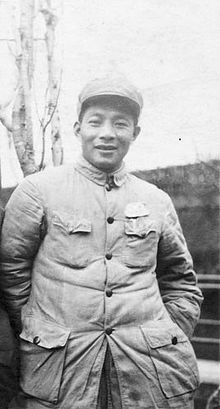Chen Pixian (simplified Chinese: 陈丕显; traditional Chinese: 陳丕顯; pinyin: Chén Pīxiǎn; March 20, 1916 – August 23, 1995) was a Chinese Communist revolutionary and politician. He served in several prominent roles, including party chief of Shanghai and party chief of Hubei province. He was purged at the beginning of the Cultural Revolution but was later rehabilitated.
Biography
Chen Pixian was born in Shanghang County, Fujian in 1916. He joined the Chinese Communist Party (CCP) in 1931.[citation needed]
After the People's Republic of China was founded, Chen was the head of the party organization in Shanghai from 1965 to 1967. In 1967, Chen was ousted from power during the January Storm by radical elements led by Zhang Chunqiao. Chen spent much of the Cultural Revolution in solitary confinement. He wrote to Mao to resume his work, to no avail. Eventually Deng Xiaoping recalled Chen back to work on the pretext of medical treatment, and Chen was given the job of vice chairman of the Shanghai Revolutionary Committee. After the Cultural Revolution he served as party chief of Hubei.[citation needed]
Chen served concurrently as Party Secretary of Hubei and its Governor.[1]: 113
He became a Secretary of the Secretariat of the Chinese Communist Party in 1982, and was the Secretary of the Central Political and Legal Affairs Commission from 1982[1]: 113 to 1985.
Chen died in 1995, aged 89. He was eulogized with standard honours bestowed to high-ranking members of the CCP.[citation needed]
